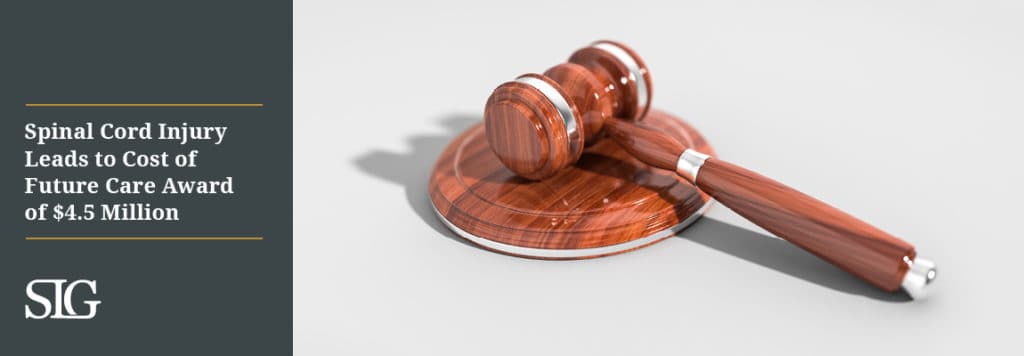
16 Mar Spinal Cord Injury Leads to Cost of Future Care Award of $4.5 Million
The case of Warick v. Diwell [2017] BCSC 68, involves a 59-year-old Plaintiff who sustained significant injuries in 2009 in a collision with an oncoming semi-truck/trailer unit driven by the Defendant that crossed into the Plaintiff’s lane. In addition to her paralyzing spinal cord injury, the Plaintiff also sustained perforation of her large and small intestines and damage to her bladder. She had undergone six surgeries to address these injuries by the time of trial, and further surgeries continued to be a possibility. She also sustained fractures of her left wrist and two bones in her left hand.
By trial, the Plaintiff’s personal injury claims arising from the accident had all been settled except the matter of the cost of her future care. Mr. Justice T.A. Schultes made the following comments regarding future care assessments:
[201] The essential principles that determine an award for the cost of future care are not really in issue in this case, with each party simply emphasizing different aspects of the same overall body of authority in their submissions.
[202] With respect to the standard of proof to be met, “[a] plaintiff who seeks compensation for future pecuniary loss need not prove on a balance of probabilities … that she will require future care because of the wrong done to her. If the plaintiff establishes a real and substantial risk of future pecuniary loss, she is entitled to compensation…”: Graham v. Rourke (1990), 74 D.L.R. (4th) 1 (Ont. C.A.).
[203] Claims made for future care must be both medically justified and reasonable. An award “should reflect what the evidence establishes is reasonably necessary to preserve the plaintiff’s health”: Milina v. Bartsch (1985), 49 B.C.L.R. (2d) 33 (S.C.) at paras. 199 and 201; aff’d (1987), 49 B.C.L.R (2d) 99 (C.A.).
[204] This requirement of medical justification, as opposed to medical necessity “requires only some evidence that the expense claimed is directly related to the disability arising out of the accident, and is incurred with a view toward ameliorating its impact”: Harrington v. Sangha, 2011 BCSC 1035, at para. 151.
[205] The question has often been framed as being whether a reasonably-minded person of ample means would be ready to incur a particular expense: Andrews v. Grand & Toy Alberta Ltd., [1978] 2 S.C.R. 229 at p. 245.
[206] The evidence with respect to the specific care required does not need to be provided by a medical doctor: Jacobsen v. Nike Canada Ltd. (1996), 19 B.C.L.R. (3d) 63, (S.C.) at para. 182. However, there must be some evidentiary link drawn between the physician’s assessment of pain, disability, and recommended treatment and the care recommended by a qualified health care professional: Gregory v. Insurance Corporation of British Columbia, 2011 BCCA 144 at para. 39.
[207] Damages for the cost of future care are assessed, not mathematically calculated: Uhrovic v. Masjhuri, 2008 BCCA 462 at paras. 28-31. There is an inherent degree of uncertainty and discretion in making such awards. Because awards are made “once and for all” at the time of trial, judges must “peer into the future” and fix the damages “as best they can”. This includes allowing contingencies for the possibility that the future may differ from what the evidence at trial indicates: Krangle (Guardian ad litem of) v. Brisco, 2002 SCC 9, at para. 21.
[208] While no award should be made in relation to an expense that the plaintiff will not actually incur (Izony v. Weidlich, 2006 BCSC 1315 at para. 74), the focus of inquiry when a justified item or service was previously unused, is whether it is “likely to be incurred on a going forward basis”: Gilbert v. Bottle, 2011 BCSC 1389 at para. 251.
[209] A plaintiff is not entitled to an award for that portion of their costs of future care that will be publicly funded. However, the risk that access to public funds may be lost in future is a proper basis to provide a contingency in the award: Boren v. Vancouver Resource Society for the Physically Disabled, 2003 BCCA 388 at para. 25[6].)
If you or someone you know has been injured in a car accident, please feel free to contact Sitka Law Group. Sitka Law Group is conveniently located on Shelbourne Street near the intersection of the borders of Victoria, Oak Bay and Saanich.



